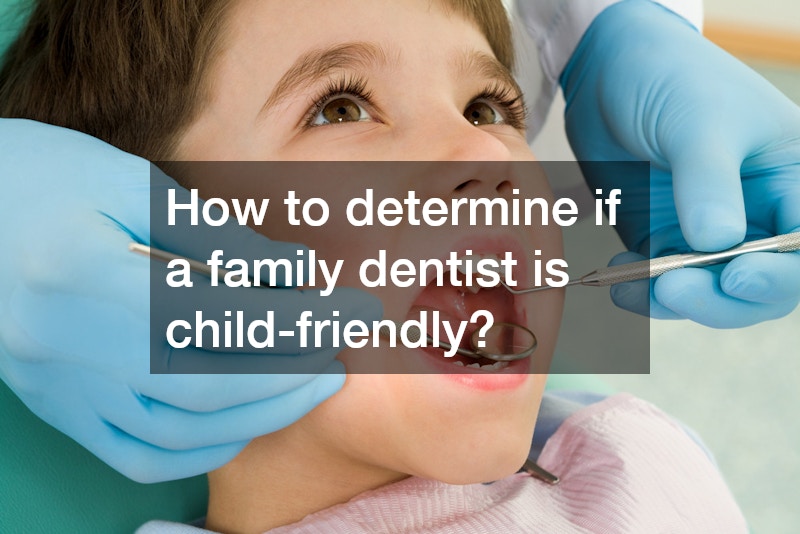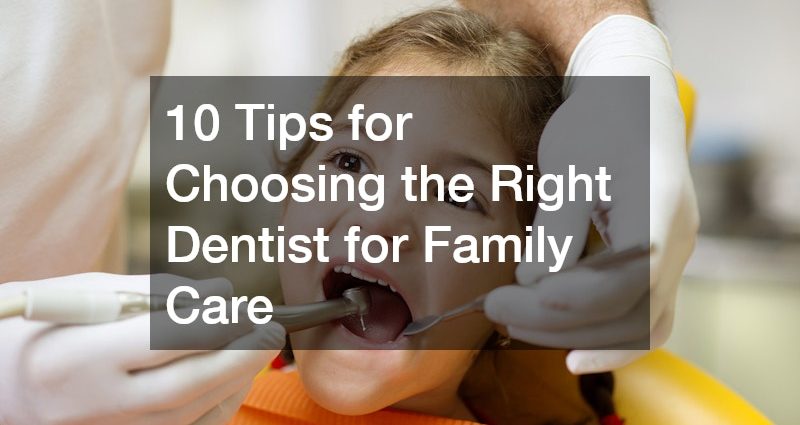
Choosing the right dentist for your family is an important decision that will affect everyone’s health and well-being. Dental health is vital for overall health, and ensuring that your family receives high-quality care is essential for maintaining healthy teeth and gums. Whether it’s regular checkups, emergency dental visits, or more specialized treatments like orthodontics or cosmetic dentistry, the dentist you choose plays a crucial role in your family’s dental journey.
In this article, we will guide you through 10 essential tips to help you make an informed decision when selecting the best dentist for your family. From understanding the dentist’s qualifications to assessing their approach to child-friendly care, we’ve got you covered. Let’s dive into the key factors that will help you find the right dentist for family care.
1. What qualifications should a family dentist have?
The first and most important step in choosing a family dentist is ensuring that the dentist is qualified to treat your entire family. Family dentistry covers a wide range of dental services, and you want to be confident that the dentist has the necessary education and expertise to care for all ages, from young children to adults. Here’s what you should look for in their qualifications.
Understanding educational backgrounds
A qualified family dentist should have completed a degree from an accredited dental school. In addition to this, many family dentists also undergo specialized training in various aspects of dentistry. These may include areas like orthodontics, pediatric dentistry, and even cosmetic dentistry. A dentist with a broad range of training will be better equipped to handle the diverse dental needs of a family.
Importance of licenses and certifications
A licensed dentist is a must. Ensure that your dentist has the appropriate licenses and certifications required by your state’s dental board. This ensures that they are legally allowed to practice and that their training is up to standard.
Membership in dental associations
Look for a dentist who is a member of reputable dental associations. Membership in organizations like the American Dental Association (ADA) is an indicator that the dentist is committed to maintaining high standards of care and staying up-to-date with the latest in dental research and techniques.
Specializations in family dentistry
Although family dentists typically offer a broad range of services, some may specialize in particular areas of dentistry, such as pediatric care or orthodontics. If any member of your family needs specialized care, having a dentist with expertise in these areas can be incredibly beneficial.
2. How to assess the experience of a family dentist?
Experience is an essential factor when evaluating potential family dentists. A dentist with years of experience is likely to have a better understanding of how to manage the needs of different family members.

Reviewing their history with family care
A family dentist with experience in providing care to multiple generations of patients can be an excellent choice. Look for a dentist who has experience working with children, teens, adults, and seniors to ensure they can cater to the needs of every family member.
Awards and recognitions
Many dentists are recognized for their excellence in patient care. Look for any awards or accolades they may have received, as these can serve as a testament to their skill and dedication.
Years in practice
The longer a dentist has been practicing, the more likely they are to have dealt with a wide variety of dental issues. Dentists with years of experience are often better at diagnosing and providing solutions for complex problems.
Community involvement
A dentist who is actively involved in the community may have a deeper connection to their patients. Community engagement is a sign that they care about more than just running a business—they want to make a positive impact on the lives of those around them.
3. What should a first consultation include?
A first consultation with a family dentist is an excellent opportunity to evaluate the practice and see if it’s the right fit for your family.
Initial assessment procedures
During the first visit, a family dentist should perform a thorough examination, which may include X-rays, a visual check-up of the teeth and gums, and a discussion of any immediate concerns. This will give you an idea of the dentist’s approach to care and their thoroughness.
Discussing family dental history
The dentist should take time to understand your family’s dental history, including any genetic factors that may affect oral health. Be prepared to discuss any existing dental issues or concerns that you or your family members may have.
Explaining treatment plans
After the initial assessment, the dentist should provide a clear explanation of any necessary treatments and answer any questions you have. This is a good time to inquire about services like orthodontics or cosmetic dentistry, as well as cost and payment options, including how they handle medicare dental services for eligible patients.
Understanding available dental services
Ensure that the dentist offers a full range of services for all family members. From preventive care to orthodontics and cosmetic procedures like dental crowns, it’s important to choose a dentist who can meet everyone’s needs.
4. How to determine if a family dentist is child-friendly?
When looking for a dentist for family care, it’s essential to ensure that the dentist is child-friendly, as a positive experience at the dentist’s office can set the tone for a lifetime of good dental habits.

Children-specific dental techniques
A dentist who specializes in pediatric care, also known as a pediatric dentist, will have the expertise to deal with children’s dental needs. They will use child-friendly techniques to make visits less intimidating for young patients.
Interactive dental education for kids
The dentist should take time to explain dental procedures to children in a fun and engaging way. Interactive education can help kids feel more comfortable and understand the importance of brushing and flossing.
Office environment for children
Look for a dental office that is welcoming and calming for children. Bright colors, toys, and child-sized furniture can help children feel at ease in a dental environment.
Availability of preventative care
A family dentist should emphasize the importance of preventive care, including regular checkups, cleanings, and early treatments like fluoride treatments and dental sealants.
Feedback from other parents
Don’t hesitate to ask other parents about their experiences with the dentist. Their insights can give you a better understanding of how the dentist interacts with children.
5. Why is location important when choosing a family dentist?
Location is an often-overlooked factor, but it plays an important role in how often you can visit the dentist and how accessible care is in case of emergencies.
Proximity to your home
Choosing a local dentist who is close to your home makes it easier to keep regular appointments, whether for routine checkups or emergency care.
Accessibility and parking options
A family dental office with ample parking and easy access will save you time and frustration when visiting.
Convenience for regular appointments
If the dentist is nearby, you are more likely to stay on top of your family’s dental care by scheduling regular visits.
Emergency cases consideration
In case of an emergency dental visit, proximity becomes even more important. A dentist located close to your home can provide quicker service in urgent situations.
Availability of public transport
If you rely on public transportation, it’s helpful to choose a dentist located near bus or subway lines.
6. How to evaluate office cleanliness and technology?
The cleanliness of a dental office and the technology they use are both important indicators of the quality of care you can expect.
Sanitation standards and practices
A well-maintained office with clean facilities is essential to ensure the safety and health of patients. The office should adhere to strict hygiene protocols, including sterilization of dental tools.
Modern dental technologies
Check if the dentist uses the latest technologies, such as digital X-rays, which reduce radiation exposure, or advanced treatments like sleep apnea remedy devices. These tools not only improve the quality of care but also make procedures more efficient and comfortable for patients.
Reception and patient areas’ condition
The overall condition of the waiting area and reception can tell you a lot about how the office is managed. Clean, well-organized spaces indicate a high level of professionalism.
Office staff professionalism
Friendly and professional office staff contribute to a positive experience. They should be attentive, knowledgeable, and responsive to your needs.
Digital record-keeping and privacy
Modern family dental offices should have secure digital systems for patient records, ensuring privacy and easy access to your family’s dental history.
7. What questions should you ask during the visit?
It’s important to ask the right questions during your visit to ensure that the dentist is the right fit for your family’s needs.

Clarifying availability for emergencies
Ask the dentist if they are available after hours or for emergency care. Knowing that you can reach them during a dental emergency provides peace of mind.
Understanding dental procedures offered
Inquire about the full range of dental services available, from basic preventive care to more complex procedures like dental crowns and cosmetic dentistry.
Discussing office hours and appointment scheduling
Make sure the office hours align with your schedule. Many family dental offices offer evening or weekend appointments to accommodate busy families.
Inquiring about their approach to dental anxieties
If any family member experiences dental anxiety, ask how the dentist addresses this issue. Many dentists offer sedation options or other methods to make visits more comfortable.
Verifying insurance partnerships
Check if the dentist accepts your insurance plan or offers payment plans. Ensuring compatibility with your medicare dental coverage is essential for managing costs.
8. How to gauge the cultural fit of a family dentist?
Finding a dentist whose approach aligns with your family’s values and preferences is crucial for building a long-term relationship.
Communication style and patient interaction
Observe how the dentist communicates with you and your family. A good family dentist should be approachable, empathetic, and willing to answer all your questions.
Philosophy on preventative care
Ensure the dentist emphasizes the importance of preventive care, which can save your family time and money in the long run.
Family-friendly policies and practices
Look for a dentist who fosters a welcoming and inclusive environment for families. Policies that accommodate busy schedules or provide resources for family dental education are a plus.
Sensitivity to diverse needs and preferences
A good dentist for family care should be respectful of your family’s unique needs and preferences, including accommodating any language or cultural considerations.
9. What are the red flags to avoid in a family dentist?
Some warning signs can help you identify a dentist that may not be the right fit for your family.

Unresponsive or unprofessional behavior
If the dentist or office staff are consistently unresponsive or rude, it’s a major red flag. You should feel welcomed and valued as a patient.
Poor communication or lack of transparency
A good dentist should explain procedures, costs, and treatment plans clearly. If there is a lack of transparency or evasiveness, consider looking elsewhere.
Overcharging or hidden fees
Ensure that pricing is clear and upfront. If the dentist is unwilling to provide cost estimates or has a pattern of overcharging, it’s a sign that they may not have your best interests in mind.
Poor hygiene and maintenance standards
If the office is not clean or appears poorly maintained, it’s best to look for a different family dental office. Hygiene is crucial in maintaining safe and effective care.
10. Why is it important to establish a long-term relationship?
Establishing a long-term relationship with your family dentist offers several benefits that make the investment worthwhile.
Consistency in care and treatment
Having a long-term dentist allows for consistent care over time. They will become familiar with your family’s dental history and preferences, leading to better outcomes.
Building trust and comfort with the dentist
Long-term relationships build trust, which is essential for both adults and children who may feel anxious about visiting the dentist.
Better understanding of your family’s dental history
A dentist who knows your family’s dental history can anticipate potential issues and offer preventative solutions tailored to each member.
Personalized treatment plans and reminders
A family dentist will provide personalized treatment plans and schedule reminders for check-ups, making it easier to maintain good oral health for everyone in the family.
Finding the right dentist for family care involves careful consideration of many factors, from qualifications to office environment and child-friendly care. By following these 10 tips, you can find a dentist who is well-equipped to meet your family’s dental needs. Whether you need basic preventive care, cosmetic dentistry, or specialized treatments like orthodontics, choosing a dentist for family care who is skilled, compassionate, and accessible is essential for maintaining lifelong oral health.

